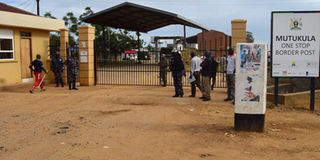URA raises Shs63b from tax penalties

Mutukula border post is one of the stationss installed with scanners. PHOTO | ISSA ALIGA
What you need to know:
- Records indicate that non-intrusive inspection has in the last two years conducted 601,540 inspections, out of which 7,306 alerts of trade mis –invoicing were raised. Of this, 2,318 have been successful representing 68.2 per cent.
Government raised Shs63b from penalties between 2018 and 2020 from companies and individuals who under-declared imports at various border points around the country, according to Uganda Revenue Authority (URA).
The penalties, according to Mr Vincent Seruma, the URA head of corporate communications, come after the government introduced Non-Intrusive Inspection (NII) scanners in 2018 in efforts to curb trade mis-invoicing.
Trade mis-invoicing involves deliberate falsification of the value, volume or and type of commodity in the commercial transaction of goods or services by at least one party to the transaction.
“The scanners are massive machines where truck drives into for scanning and the system uses X-ray technology,” Mr Seruma said in an interview early this week, noting the server is fixed with provisions where USB drives and USB DVD RW are inserted to allow for burning of images in a standard format.
Data obtained from URA indicate that the operations of the non-intrusive inspection unit started on August 2, 2018 and over 13 non-intrusive inspection equipment have been installed at major entry points around the country including Malaba, Busia, Mutukula, Elegu, Entebbe and Katuna.
Records indicate that non-intrusive inspection has in the last two years conducted 601,540 inspections, out of which 7,306 alerts of trade mis –invoicing were raised. Of this, 2,318 have been successful representing 68.2 per cent.
“The team channels most of the alerts to Kampala for handling and the successful alerts raised penalties and taxes amounting to Shs63.1b since the month of August 2018 to July 2020,” Mr Seruma said.
Mutukula border post had 7,852 inspections, from which the non-intrusive inspection raised 15 alerts, out of which 14 were successful with mis-invoicing, translating into 99 per cent.
The scanning seeks to ensure that what is declared on import and export documents corresponds with what is being carried in the containers.
Smuggling across border posts remains one of the largest tax offences.
Mr Amos Mugaju, a trader at Mutukula border who doubles as a clearing agent, said although the scanners are available, some traders still bypass the system.
“Some traders trespass in connivance with URA officials and security personnel and their cargo is never inspected,” he said, but noted that although some traders continue to use porous border points such as Ntatamukyi in Rakai, Kamuli in Kyotera and Buhunga in Isingiro, the scanners have reduced smuggling and under declaration of goods.
Rakai and Kyotera alone have more than 1,500 porous border entry points.
Ms Claire Komunda, the vice chairperson Mutukula central zone applauded government for curb smuggling at gazetted border points, but called for more vigilance.
Cross border trade
According to the 2011 Informal Cross-border Trade survey by Uganda Bureau of Statistics, the combined exports earnings (formal and informal) amounted to $2.5b, of which, formal exports were worth $2.15b, while informal exports accounted for $355.8m.
The survey indicates that the dominant border points include Mpondwe, Bibia, Busia, Katuna, Mutukula and Orab, which account for 80 per cent of Uganda’s informal exports.
This article was written as part of Wealth of Nations, a media skills development programme run by Thomson Reuters Foundation in partnership with African Centre for Media Excellence.




